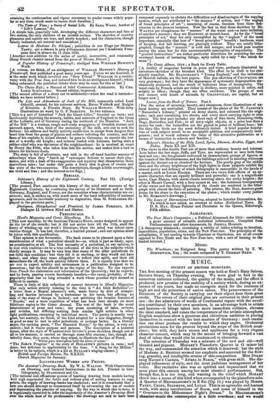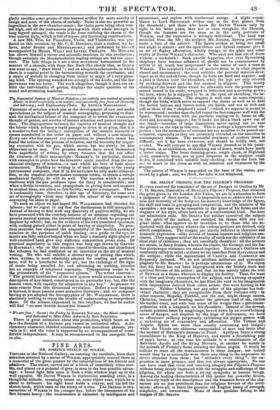MUSIC,
SOCIETY OF BRITISH MUSICIANS.
THE first meeting of the present season was held at Erat's Harp Saloon, Berners Street, on Thursday evening. We were glad to find in the numerous audience collected, the quality of the music, and the effect it produced, new promise of the stability of a society which, during an ex- istence of ten years, has made an energetic stand for the interests of high art and the protection of native talent. The perseverance of the Directors of the Society in carrying out their object does them great credit. The errors of their original plan are corrected in their present one : the due admixture of works of Continental repute with the novel- ties contributed by their own members, is an advantage both to artists and hearers—it brings talent into more immediate collision, elevates the ideal standard, and raises the temperature of the artistic atmosphere. English musicians show a generous and chivalrous ambition in placing themselves in contact with the best masters of Germany : such emula- tion can alone produce the results to which they aspire. Orchestral productions seem for the present beyond the scope of the British musi- cians; but still, they have means and appliances for a very elegant chamber-concert, which may be the means of bringing forward a vast deal of talent that would else be condemned to obscurity. The selection of Thursday was a mixture of the new and old—well blended and piquant. MOZART'S Pianoforte Quartet in G minor led the way, and commanded the attention which it deserved : but the style of Madame A. BERTINI seemed too emphatic and accented for the flow- ing, graceful, and intelligible strains of this composition. Miss DOLBY sang Ilsymes Cantata, "Arlene. in Naxos," with great skill. She dis- played refinement of style, and the most judicious management of her voice. Her recitative also was so spirited and impassioned that we must place this cantata among her most classical performances. But, though fine, it is too long, and wanting in the relief which MOZART threw into a scene of this kind when accompanied by the pianoforte solo. A Quartet of MENDELSSOHN'S in E flat (Op. 12.) was played by Messrs. PATEY, CHIPP, STEPHENS, and Luxes. This is an agreeable and learned work, with many recollections of Baca, and some of himself in the "Overture to the Midsummer Night's Dream." In MENDELSSOHN% chamber-music the counterpoint is a little overdone ; and we would
gladly sacrifice some grains of this learned artifice for more novelty of design and more of the charm of melody. Noise is also too powerful an ingredient in the new chamber-music: the violin parts being often writ- ten high, and all the instruments playing with their whole strength in long fugued passages, the result is far from realizing the charm of the true quartet style, which is full of repose and fascinating combinations.
A new MS. Trio, for Pianoforte, Violin, and Violoncello, was pro- duced on this occasion, by Mr. C. E. HORSLEY, (late a student, we be- lieve, under SPOHR and MENDELSSOHN,) and performed by himself accompanied by Messrs. WILLY and LOVELL Primefes. Mr. FIORSLEY has shown himself a clever and scientific musician in this production ; though certainly the Mendelssohnian leading-strings are but too appa- rent. The best things in it are a slow movement harmonized in the manner of a chorale, with those fine Bach-like chords that, as GLuex was wont to say, "draw blood"; and an allegretto scherzando, in which there is a capital point in the harmonizing towards the conclusion, and a strain of melody in changing from minor to major of a very pleas- ing kind. The opening smacked too strongly of the Lieder, and the last movement was too noisy. The work altogether, though it does not ex- hibit the individuality of genius, displays the staple qualities of the sound and promising musician.



























 Previous page
Previous page